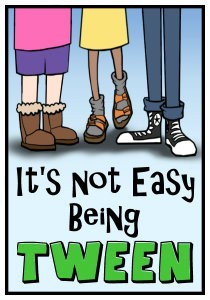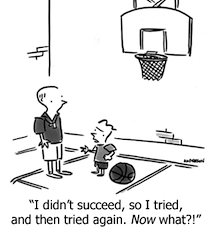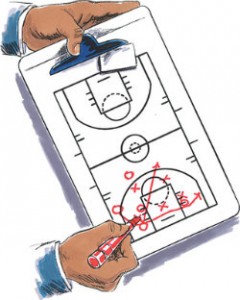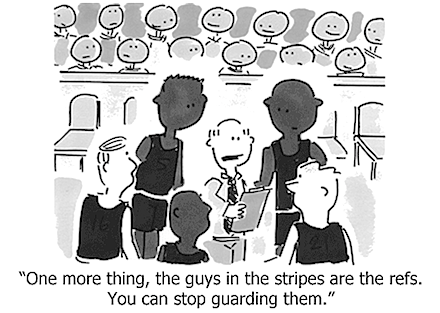What Great Coaches Know about Teaching
A MiddleWeb Blog

I have had the privilege of teaching with incredibly talented, successful, yet beloved basketball teachers/coaches. They were able to get excellent results out of their teams, while still remembering their roles as instructor and maintaining their dignity and that of their players. And they won—a lot.
What can classroom teachers learn from great coaches?
PASSION
“Discover your gift, develop your gift, and then give it away every day.” ~ Coach (Don) Meyer
Good coaches are passionate about their sport and know it inside and out. They also constantly strive to be better for the benefit of their team. They got into coaching to try to help young people, as did teachers. On our toughest days, when our class isn’t “winning” and we’re beaten down by the demands of the job, we need to remember why we chose this most noble of professions. Our love for learning is a gift we must share.
PLAYERS
“Each group and each youngster is different. As a leader or coach, you get to know what they need.” ~ Coach (Mike) Krzyzewski
Good coaches start with the concept that each player has something to offer to the team. They also get to know each athlete’s strengths and weaknesses and work to enhance the strong areas and improve the weak. They adapt their training to the growth of their athletes. They also ensure that each person on the team is noticed and valuable.
With the concept of personalized learning currently at the forefront in teacher circles, educators could take a page from the coaches’ playbook and get to know their students as individuals and adapt instruction to what will best serve each kid. The era of one size fits all has passed.
TEAMWORK
“If you want to go fast – go alone; If you want to go far, you have to go with others.” ~ Coach (Dale) Brown

RELATIONSHIPS
“Until you can reach in and grab that kid’s heart, you can’t coach him.” ~ Coach (Bill) McNees
I have written before about the benefits of building a positive rapport with your students. Coaches know this too. They know that a player won’t perform well or put forth their best effort if they don’t like the coach or feel the coach doesn’t like them. That same goes for classroom teaching.
RESPECT
“Shout praise and whisper criticism.” ~ Coach (Don) Meyer
I am always extremely uncomfortable when I see an NCAA coach in any sport get right in a player’s face and start screaming at them when they make a mistake. There is absolutely no good that can come of verbally abusing a player or a student. It demeans them and shows a lack of humanity. Young people are, first and foremost, people and deserve the same consideration that we would give our friends and family.
LIFE
“To me there are three things everyone should do every day. Number one is laugh. Number two is think—spend some time in thought. Number three, you should have your emotions move you to tears. If you laugh, think, and cry, that’s a heck of a day.” ~ Coach (Jim) Valvano

The best coaches make sure that their players spend quality time with their families as well as on their studies. They produce well-rounded student-athletes who have more to them than their ball handling abilities.
Good teachers can see when a child is burning out on too many extracurricular activities, and we have seen obsession take root as well. One of the best things we can do for our students is to remember that they have a life outside of school and encourage and allow them to enjoy it.
FUNDAMENTALS
“It’s the little details that are vital. Little things make big things happen.” ~ Coach (John) Wooden

Often times teachers jump right to expecting a strong final product, without regard to explicit instruction in the intermediate skills. We would be better served by mastering each interim step before expecting a well-done final result.
FEEDBACK
“In the absence of feedback, people will fill in the blanks with a negative. They will assume you don’t care about them or don’t like them.” ~ Coach (Pat) Summitt
Coaches are experts at giving prescriptive feedback. They spend the bulk of their time giving hands-on demonstrations, teaching technique, showing game film to illustrate areas for improvement, and pointing to professionals as expert models.

What’s more, we need to make students an integral part of this process. Isiah Thomas said that, “Instead of me telling them what they need to work on, I wanted to hear from them what they needed to work on.” Self-monitoring and reflection are useful exercises. Whenever possible, it would be beneficial to have kids determine what they want to improve instead of it always coming from above.
MISTAKES
“If you’re not making mistakes, then you’re not doing anything. I’m positive that a doer makes mistakes.” ~ Coach (John) Wooden
I have read about it taking 10,000 hours to become an expert at something. There are a lot of mistakes that are made along the way, and there is always room for improvement, even at the expert level.
Athletes and other professionals such as musicians know this, but this concept doesn’t seem to translate to our more perfectionist students. They want to do everything perfectly right out of the gate and see the messy learning process as failure.
Schools across the country are working on turning around this mindset, but there is still work to be done. Mistakes should be celebrated, because it means we are learning. At the same time, I joyfully acknowledge when students master a skill that was hard for them.
FUN
“Just play. Have fun. Enjoy the game.” ~ Michael Jordan
The most elite athletes know that, at the heart of it all, it is still just a game. Many say that they have a blast playing and know it is time to get out when they don’t. While I am not going to go so far as to say that everything I teach in class is inherently fun, learning a skill and practicing that skill can be enjoyable.
This is where I, as a teacher, can have the most impact on how the day goes. Yes, it requires extensive effort on my part to design meaningful, enjoyable learning experiences, but I get tremendous pleasure out of my students telling me how much fun they are having while they are learning. It is not a chore to me, so it doesn’t seem like one to them.
Calling the plays, and listening too
The most winning coaches are often the most beloved and successful. They are definitely doing something right. If I want my students to win the game, I need to be willing to teach more like a coach and settle for no less than their best.
I agree with the words of Magic Johnson: “All kids need is a little help, a little hope, and someone who believes in them.”
Cartoons credit: © Andertoons, used via subscription
































